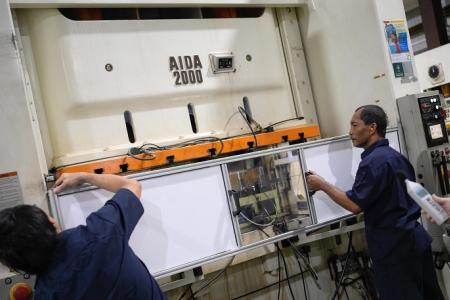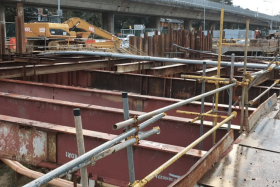Soundproofing at bicycle parts factory cut hearing woes for workers
At Nakano Metal Press’ bicycle parts manufacturing factory in Joo Koon, many of the metal stamping machines are fitted with soundproofing panels or foam boards.
It is part of an effort to bring down noise levels at the factory, and protect the hearing of workers who operate and run the machines.
Since 2021, the firm has fitted 17 of its 21 machines with either soundproofing enclosures or acoustic boards. It plans to do the same for its remaining machines by mid-2025.
This move, which is part of a Ministry of Manpower (MOM) initiative to address noise-induced deafness at workplaces, has brought down noise levels at the site by five to 10 decibels – with the most significant reduction observed in the newer machines fitted with fully enclosed soundproofing covers.
Speaking during a media visit to the factory on Oct 17, Nakano assistant quality assurance engineer Chin Huey Lee said the newer soundproofed machines are more comfortable to work with.
The 45-year-old, who has been working for the firm for seven years, said: “In the past, I would get headaches when I went home (after operating the older machines). But now, I won’t.”
Noise-induced deafness accounted for the majority, or 64 per cent, of occupational diseases here, according to MOM’s workplace safety and health figures for the first half of 2024.
The ministry said that since 2021, it has been engaging employers in industries where workplaces have high noise levels to raise awareness of the importance of protecting workers’ hearing.
Ms Jaime Lim, director of the occupational safety and health specialist department at MOM, said employers are required to set up measures to control sources of noise and get workers to go for annual hearing tests if their workplace noise levels exceed normal volumes.
This is part of an ongoing long-term plan to prevent noise-induced deafness across various sectors, she said.
Ms Lim also said MOM has a tax incentive scheme to offset taxes that employers incur from replacing noisier machines.
Over the next two years, the ministry will specifically target about 7,000 metalworking companies here to roll out noise-control measures, since manufacturing companies – and metalworking firms, by extension – contribute the most to occupational diseases, said Ms Lim.
She added that the main challenge lies in getting employers to see the value in protecting their workers’ hearing. One reason for this is that noise-induced deafness can take time to manifest, as hearing problems do not surface immediately after a person is exposed to excessive noise.
But Ms Lim pointed out that taking measures to address excessive noise and protect workers’ hearing ensures that productivity is maintained at work.
Nakano general manager Galvin Tan said new soundproofed metal stamping machines can cost about $2 million each, and that after the firm upgraded its machines, it has noticed “a lot of improvements” in bringing down noise-induced deafness among the workers.
The factory has received zero reports of hearing abnormalities since 2022. In 2021, there was one case, while before that there were two or three cases a year.
Get The New Paper on your phone with the free TNP app. Download from the Apple App Store or Google Play Store now


